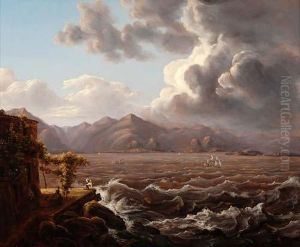Konrad Usteri Paintings
Konrad Usteri was a Swiss artist known for his works in drawing and printmaking. Born on July 10, 1764, in Zürich, Switzerland, Usteri emerged in a period of European art where the neoclassical movement was beginning to take shape, which often reflected a sense of order and embraced classical ideals. However, Usteri's work was also influenced by the sentiments of the Romantic era, which was characterized by an emphasis on emotion and individualism as well as a glorification of the past and nature.
Usteri worked primarily on portraits and landscapes. His drawings often captured the subtlety of the human face and the natural beauty of the Swiss landscape. Despite not being widely known outside of his home country, Usteri's work contributed to the Swiss artistic tradition and offered a glimpse into the cultural and social milieu of his time.
Throughout his life, Usteri was engaged in the cultural life of Zürich. He was a contemporary of other Swiss artists and intellectuals who were influenced by the broader European intellectual movements of their time. Usteri's works are preserved in various Swiss collections, where they continue to be studied and appreciated for their historical value.
Konrad Usteri passed away on August 9, 1833, in Zürich. Although he may not be as renowned as some of his European contemporaries, his body of work offers valuable insights into Swiss art of the late 18th and early 19th centuries.

